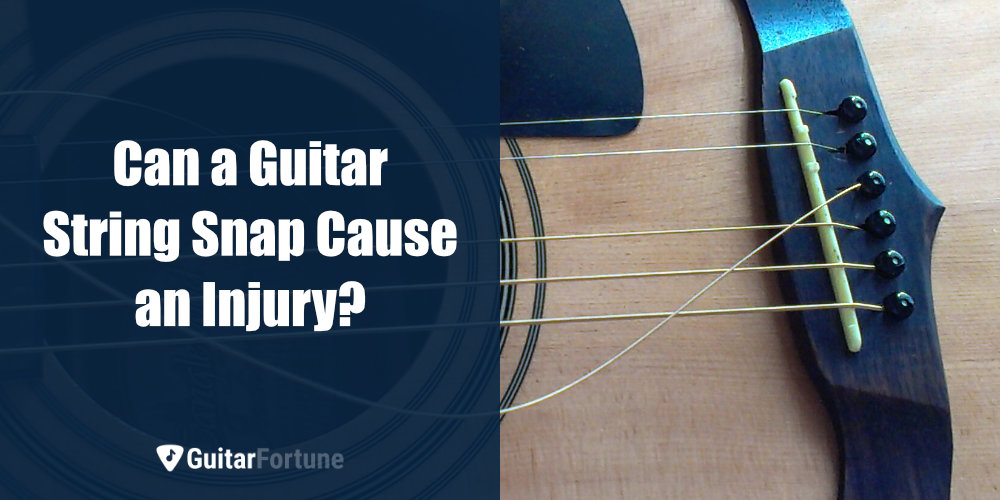For beginner guitarists, images of cut fingers and sliced eyes play in their heads every time they restring or tune up their guitar. When in reality, the dangers of a snapped string are very minimal.
When a guitar string snaps, it’s very, very rare that it hurts or causes any injury to the player. Of course, there are outliers and people love to draw attention to the horror stories, but 99% of the time, a snapped guitar string doesn’t hurt when it breaks.
Contents
Can a Guitar String Snap Cause an Injury?
Now, while it’s extremely rare that a snapped string is going to cause injury, freak accidents have been known to happen.
Take this guy, who was impaled by the sharp end of his strings when they snapped unexpectedly. Lucky for him, it only took a quick trip to the E.R to pull it out and by the next day, “it was pretty much normal. Hard to see where it even went in”. These types of injuries, while gnarly looking, aren’t usually serious or life threatening.
Just remember to keep your eyes away from the guitar when you’re tuning or stretching strings as cuts there will definitely take a little more than a day to heal.
How Common is it for Guitar Strings to Snap?
It’s not totally uncommon for a guitar string to snap. Steel strings have an average lifespan of about 2-4 months, so any strings you continue to use after that time runs the risk of snapping and injuring you.
There are also a few things that can increase the likelihood of strings snapping:
- Changes in humidity can cause the strings to weaken and break, so if you’re someone who moves from very humid to very dry environments regularly, you will increase the risk of your strings snapping.
- Your playing style can also impact the likelihood of a string breaking. Blues and rock guitarists who utilize sharp bends can expect to have a few strings snap on them during their playing career as the strings are exposed to more pressure.
How To Prevent Guitar Strings from Snapping
Now that we know a bit more about why guitar strings snap, let’s walk you through some ways to prevent that from happening:
- Change your strings regularly
Wear and age are two of the biggest reasons your strings can snap, so using fresh, new strings will massively decrease the chances of your strings snapping and injuring you.
- Checking for issues or defects at the contact points
There are three main areas where your strings come into direct contact with the guitar body: the bridge, the frets and the nut.
Breaks occur most often at the bridge, so check that your saddle isn’t too sharp or rough where it touches the string. Taking a file or bit of sandpaper to smooth it down can help prevent strings from snapping.
This is the same with your frets and at the nut. Any sharpness will cause the strings to break, so using a file or a bit of sandpaper to smooth these areas down can help prevent string breakages.
- Overtightening your strings
One of the most common reasons for snapped strings is overtightening. Guitar strings need tension to produce the right tone, but too much tension will weaken the string and leave it more prone to snapping and possibly injuring you while you play.
- String gauge
Lighter gauge strings are known to snap more often than heavier gauge ones, so if the fear of having a string snap and injure you is stopping you from playing, put some heavier gauge strings on and play with your mind at ease.
What Should I Do When a Guitar String Snaps?
If you’re at home, or just jamming out with some friends, now would be the time to bust out those new strings and get to restringing. If you’re playing live and find yourself in this situation, stay calm. There are a few things you can do:
You could stop the show entirely. Your fans, bandmates and manager probably aren’t gonna like that but, you gotta do what you gotta do.
If stopping the show isn’t something you wanna be known for, make sure to keep a backup guitar ready to go incase of a snapped string. It’s then just a case of smoothly transitioning from one to the other.
Check out Stevie Ray Vaughen, pulling off probably one of the smoothest guitar changes ever live on stage.
If you want to take it up a notch and really impress the crowd, take a leaf out of blues legend B.B King’s book and change your strings right there and then.
Conclusion
By now, you hopefully understand the dangers (or lack of) associated with a snapped string. I always try to keep one golden rule in mind when I’m restringing or tuning up – “if I keep my eyes away, they’ll work another day”.

